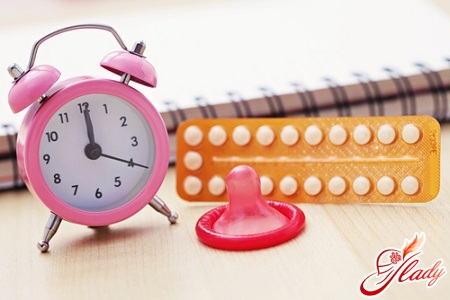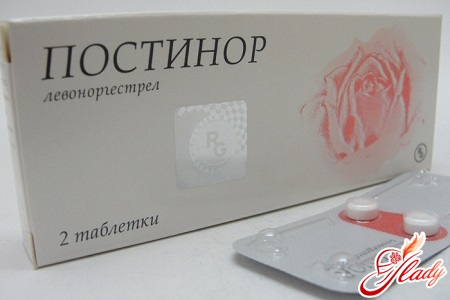
Many people have had to deal with the situation,when a condom breaks during intercourse and sperm enters the female body. Sperm penetration can also be the result of physical rape. What to do in such a case? Is there really no way out and should we now expect pregnancy? And what if this pregnancy is extremely unwanted and will require further abortion? But even in such a situation there is a way out. Modern medicine has developed emergency contraceptive pills that will help avoid unwanted conception and prevent the consequences of unprotected sex. It is worth noting right away that such emergency contraceptives can be used only in the most extreme cases; their frequent use can cause serious harm to the female body.

About emergency contraceptive pills
Otherwise, emergency contraception is calledthe next day pill. The effect of this contraceptive method lasts for 72 hours, that is, for three days following unprotected intercourse. The sooner the pill is taken after intercourse, the greater the likelihood that conception will not occur. So, if the emergency contraception is taken within 24 hours after unprotected sex, the effectiveness will be about 95%, if the pill was taken 25-48 hours after sex, the effectiveness decreases by 10%. And if the contraceptive drug was taken 49-72 hours later, the result is 55-60%. You can notice that with each passing day the pill becomes less effective. Therefore, it is recommended to take the emergency contraception on the first day after intercourse. If conception has occurred, there can be no talk of any contraception, only an abortion may be required. Next-day emergency contraception may include the following medications:
Now it is not difficult at allbuy Escapelle and Postinor at the pharmacy. Both drugs contain a large dose of the hormone levonorgestrel. The difference between the two drugs is the number of tablets: Escapelle has one, while Postinor has two.
How Emergency Contraceptive Pills Work
This contraceptive method is capable ofprevent pregnancy, causes some responses in the female body. Firstly, emergency contraceptives prevent the ovaries from releasing the egg. Secondly, they prevent the egg and sperm from meeting. In addition, they prevent the fertilized egg from entering the uterus. After taking the emergency contraceptive, the mucous secretion present in the cervix thickens, thereby creating all the conditions so that the sperm cannot enter the egg and fertilize it. This is how the substances contained in emergency contraceptive pills work. Some products contain only progestin, while others contain both progestin and estrogen. After taking these drugs, some side effects may occur due to the high content of the hormone in them. These may include nausea, diarrhea, and vomiting. Side effects often include abdominal pain, fatigue, headache, vaginal pain, and irregular menstrual cycles. It is very important to seek help from a specialist after at least one of the listed side effects occurs. Some factors may be considered a reason to contact a medical center. For example, if pain occurs in the lower abdomen three to five weeks after taking an emergency contraceptive, an ectopic pregnancy (inside the fallopian tubes) may be reported. Chest pain, rashes on the arms, legs, feet, and shoulders, blurred vision, difficulty breathing, vomiting two hours after taking the pill (this may indicate an incorrect dose of the hormone) may also occur.
Alternative to emergency drugs
Some women use it as a contraceptiveuse birth control pills (otherwise oral contraceptives), the use of which is regular. Taking such drugs allows you to avoid unwanted conception. When choosing such hormonal agents, it is imperative to consult with your gynecologist, who will select the most suitable drugs for you. Pills intended for emergency contraception cannot be taken for a long time, and even several times in a row. After all, they can simply lose their effectiveness, which will increase the likelihood of unwanted conception. If unwanted conception does occur, there are also special pills that help terminate pregnancy. Not long ago, such an emergency contraceptive as Zhenale appeared on the market. Its advantage is that the drug is non-hormonal, and the action is based on a different principle. It is tolerated much better than other drugs, its effectiveness within 72 hours is the highest and is approximately 98-99%.
More about postinore
Postinor is a drug that allowsprevent unwanted conception. The dosage of the active substance in this drug has been selected experimentally. With proper use of this drug, as a rule, it is possible to prevent unwanted conception. What do Postinor tablets contain? They contain a synthetically created analogue of the hormone levonorgestrel. This hormone is also included in the composition of drugs that are intended for planned contraception. However, the content of this hormone in Postinor is significantly higher than in planned oral contraceptives. Postinor should be taken at an interval of 12 hours. The package contains two tablets, one of which is taken after intercourse, and the second - 12 hours later. This drug can prevent unwanted conception for three days (72 hours). Sometimes it is necessary to take two doses of the drug. This is possible if vomiting occurs after taking at least one of the tablets. This may indicate that the tablet is not absorbable. It is advisable to take such tablets after meals. This will reduce the risk of vomiting. Postinor does not terminate an existing pregnancy, it can only prevent it. This means that it is impossible to use this drug to induce an abortion. But there are advantages here too: the drug does not harm the fetus, and it can be safely saved. It is very important to know that the use of emergency contraception does not prevent sexually transmitted diseases. If you have been subjected to physical violence or had unprotected sex with an unverified person, urgently consult a doctor who will rule out the presence of certain diseases. It is worth knowing that if you had another unprotected sex, but after taking Postinor, the effect of the drug does not extend to it. This drug is not intended for regular contraception, so its frequent use is unacceptable. If you took Postinor after unprotected intercourse, and pregnancy still occurred, urgently consult a doctor. After all, this drug can increase the risk of an ectopic pregnancy. That is why it is necessary to conduct an ultrasound examination, which will show where the fetus is located.
Contraceptive preparation escapel
Unlike Postinor, one capsule of Escapellecontains 150 mg of the hormone levongestrel. Therefore, there is only one tablet in the package. The drug is most effective if taken within the first 24 hours after unprotected intercourse. This drug can cause nausea and even vomiting. If vomiting occurs earlier than three hours after taking it, it is recommended to take Escapelle again. The drug can provoke menstrual irregularities, contribute to the appearance of bloody discharge from the vagina, cause a delay in menstruation, as well as chest pain. In case of a delay in menstruation for more than five days, it is recommended to take a test to determine whether you are pregnant. Taking an Escapelle tablet, like Postinor, does not negatively affect an existing fetus. If you took this drug, but were already pregnant, then there is no need to have an abortion. Both Postinor and Escapelle are ineffective if you are pregnant. There are also some contraindications for taking emergency contraception. These include severe diseases of the biliary tract or liver (cirrhosis, hepatitis). If you have had jaundice, then taking emergency contraception is strictly prohibited. Puberty in adolescents is a contraindication for taking such drugs. If you have already taken such drugs once and they caused you a number of side effects, repeated use is not recommended. This may indicate intolerance to the drug and its components.
Other contraceptives
It is possible to avoid the need for applicationone of the above drugs, simply by taking regular oral contraceptives (OC). Oral contraceptives are divided into single-component (mini-pills) and two-component (combined). Single-component ones contain only progestins. This component of the drug is able to prevent sperm from entering the uterus. This group includes such drugs as Exluton and Charozetta. One package includes 28 tablets that must be taken regularly. After the package is finished, you should immediately start taking a new one. Taking a mini-pill can serve as the main method of protection against unwanted conception. The advantage of single-component drugs is the absence of estrogen. This means that mini-pills do not have the side effect that can be observed when taking combined OCs. When taking a mini-pill, the amount of blood released monthly is significantly reduced, and menstruation becomes painless. One of the disadvantages of this type of OC is the inability to protect against sexually transmitted infections. In addition, the drug should be used at a strictly designated time, and a delay in taking even 3 hours can significantly reduce the effectiveness. As a rule, mini-pills are prescribed to women after childbirth, if the woman is breastfeeding. Such OCs do not cause any harm to the child, but, nevertheless, can cause a decrease in the amount of milk in the mother. Many women have contraindications for taking drugs containing estrogens, so mini-pills are considered an excellent alternative and an excellent means of contraception.
COCs (combined oral contraceptives)
This group includes the following drugs:drugs: Yarina, Lindinet-20, Lindinet-30, Regulon, Logest, Zhannin, Novinet, Rigevidon, Tri-Merci, Chloe, Diane-35 and others. These drugs contain both progesterone and estrogen. Like other OCs, drugs in this group block ovulation and make the cervix impassable for sperm. They are considered more reliable and effective than mini-pills. With proper use of combined OCs, the probability of getting pregnant decreases to 99.9%. COCs can restore the menstrual cycle, relieve pain during menstruation, reduce blood loss. They can reduce the risk of developing many diseases (inflammatory processes, uterine cancer, mastopathy, ovarian cancer, etc.). COCs are very often used in the treatment of some gynecological diseases (uterine bleeding, endometriosis). Like the mini-pill, COCs are not able to protect against sexually transmitted infections. The beginning of taking COCs may be accompanied by bloody discharge, pain in the lower abdomen and other unpleasant symptoms. They should be taken strictly according to the schedule, any pill taken at the wrong time can increase the chance of getting pregnant. When choosing a contraceptive, be sure to consult your gynecologist.









